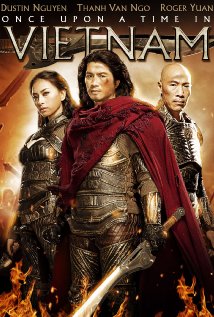
ONCE UPON A TIME IN VIETNAM
Vietnam, 2013, 105 minutes, Colour.
Dustin Nguyen, Veronika Ngo, Roger Yuan.
Directed by Dustin Nguyen.
This film is an example of the developing industry in Vietnam itself. The star and director of this film is Dustin Nuyen, who left Saigon on the day of the fall, a boat person to the United States, where he established himself in film and television.
He has written and directed this film as well is starring in it.
The once upon a time is drawn on as a child describes his mother’s storytelling with illustrations. However, the time in this Vietnamese society is a mixture, seemingly of the 19th century or earlier, the era of the Emperor, but there are some modern aspects of the film, especially the presence of motorbikes and trucks. Which means that we are looking back at Vietnamese history but with a contemporary viewpoint. At some moments, especially the trucks going along the highway, the film is reminiscent of Mad Max films.
The film relies a great deal on martial arts and martial arts battles, strong performances, choreography, effects.
The hero is one of those Man of No Name types, wandering the Vietnamese landscapes, often vivid, desert, with an emphasis on impression rather than realism. He is on a mission from the Emperor, tracking down people who have deserted from the Army and executing them. This is very quickly seen in an early sequence where a man playing a musical instrument is praised for his skills. He continues playing when the hero enters but the rest of the people in the tavern are alert and make their escape as soon as possible. There is an elaborate fight, with the hero inclined to spare the man’s life but he is executed by a General who is keeping track of the hero.
Commissioned to do further work in seeking out deserters, he travels the countryside, encountering a strange range of characters, some from the 19th-century, some looking exceedingly contemporary. He does become involved in quite a lot of fights.
Eventually arriving at a village, with the commission to take care of the village, he discovers that the wife of a baker, a respectable citizen in the town, although he is being harassed by thugs who pressurise him to sell his business to the local Lord – which he refuses. It turns out that his wife is one of the deserters. The hero recognises her, has felt for her in the past, and is torn between shielding the village and helping her or carrying out his task.
This leads to some drama, some more fights, the general who is following him turning up, leading to a confrontation between the two, the safety of the woman, the safety of the village.
The film is reminiscent of a number of Hong Kong and Taiwanese action dramas. With its strange landscapes, time zones, and the photography of the landscapes, it is very much reminiscent of the Korean film, The Good, the Bad and the Weird.